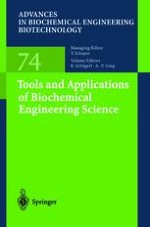2002 | OriginalPaper | Buchkapitel
Bioreactor Developments for Tissue Engineering Applications by the Example of the Bioartificial Liver
verfasst von : Inka Jasmund, Augustinus Bader
Erschienen in: Tools and Applications of Biochemical Engineering Science
Verlag: Springer Berlin Heidelberg
Enthalten in: Professional Book Archive
Aktivieren Sie unsere intelligente Suche, um passende Fachinhalte oder Patente zu finden.
Wählen Sie Textabschnitte aus um mit Künstlicher Intelligenz passenden Patente zu finden. powered by
Markieren Sie Textabschnitte, um KI-gestützt weitere passende Inhalte zu finden. powered by
Tissue engineering is the application of the principles and methods of engineering and the life sciences towards the development of biological substitutes to restore, maintain or improve functions. It is an area which is emerging in importance worldwide. This article is to show the developments in tissue engineering research by the example of the bioartificial liver. As an alternative to liver transplantation, numerous researchers have been working towards the goal of development of a fully functional artificial liver. Liver support systems based on detoxification alone have proven ineffective because they cannot correct biochemical disorders. An effective artificial liver support system should be capable of carrying out the liver’s essential processes, such as synthetic and metabolic functions, detoxification, and excretion. It should be capable of sustaining patients with fulminant hepatic failure and preparing patients for liver transplantation when a donor liver is not readily available. Although several hepatocyte-based liver support systems have been proposed, there is no current consensus on its eventual design configuration.
